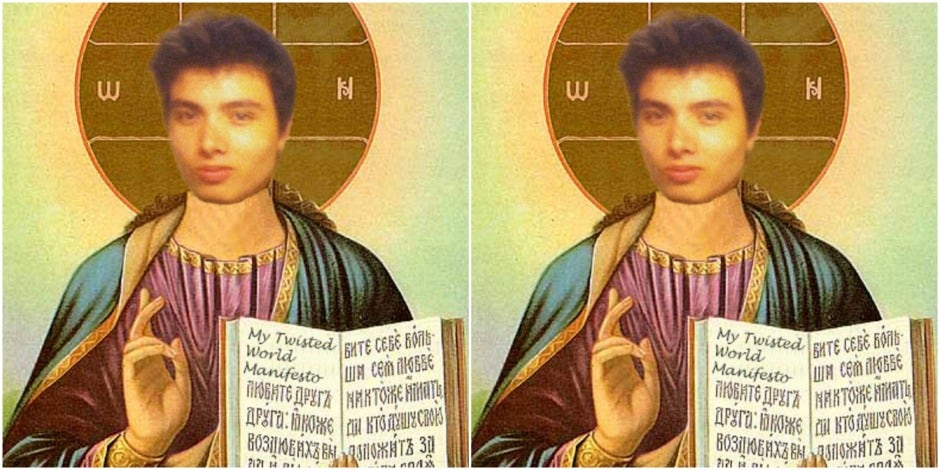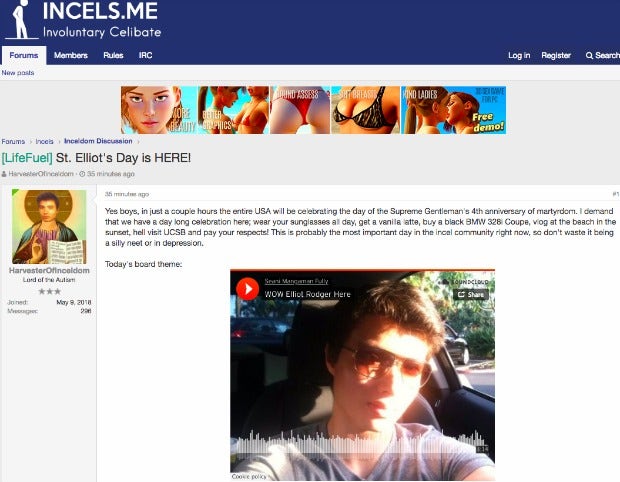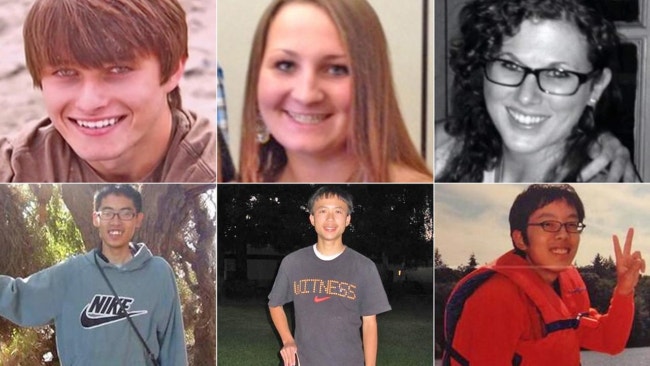It's Been 4 Years Since I Was At UCSB When 'Incel' Elliot Rodger Killed 6 People — And Male Supremacy Is Still Killing Us
How is that possible and when will it stop?
 WeHuntedTheMammoth
WeHuntedTheMammoth It had been a while since I last heard Elliot Rodger's name, let alone since I'd seen his face in that one picture pretty much every media outlet used as the main image for the articles written after he went on a mass killing spree at the University of California, Santa Barbara (UCSB) on May 23, 2014.

The photo is actually a screenshot taken from the video titled "Retribution" Rodger uploaded to YouTube that same day, in which he outlined the details and motives behind his attack, vowing to punish women for never finding him attractive.
"Tomorrow is the day of retribution, the day in which I will have my revenge," Rodger said in the video. "You girls have never been attracted to me. I don't know why you girls aren't attracted to me, but I will punish you all for it."
I remember that video — and that specific day — very well. It was four years ago, when I was also a student at UCSB.
Rodger began his attack by stabbing to death George Chen (19), Cheng Yuan "James" Hong (20), and Weihan "David" Wang (20) inside of his own apartment, after which he got into his infamous black BMW 328i and drove to a sorority house, where he shot three female students, killing Katherine Breann Cooper (22) and Veronika Elizabeth Weiss (19). As he continued driving he shot another male student, Christopher Ross Michaels-Martinez (20), who was inside a nearby deli, then went on speeding through the town, shooting and wounding several pedestrians and striking others with his car.
The rampage ended when he crashed into a parked car and police found him dead from a self-inflicted gunshot wound to the head.
Quickly after it was revealed that 22-year-old Rodger was responsible for the stabbings and drive-by style shooting rampage that left 6 of my peers dead and 14 others wounded, the myriad of YouTube videos he'd previously made began to surface as well, a collection of rambling monologues in which the self-loathing Rodger wanders listlessly around Santa Barbara, alone in his black BMW as he complains about how unfairly life treats him, his constant loneliness, and his frustration over never being able to find a girlfriend.
The entire school went on lockdown and my two roommates weren't allowed to return home until early the next morning, so I spent that night in my apartment alone. And as the sound of sirens from the police cars and SWAT vans stormed pass my window and reverberated throughout the streets of Isla Vista, CA, I couldn't stop watching those chilling videos.
How was it possible that someone could feel so entitled and so betrayed by the world that they felt justified carrying out the massacre of innocent people?
But life moves on, and I hadn't thought about Elliot Rodger in a while.
Then this past month, on Monday, April 23, Alek Minassian drove a rental van onto a busy Toronto sidewalk, killing 10 and wounding 14 others — and Rodger’s name was back in the headlines.
Just prior to the Toronto attack, 25-year-old Minassian posted this on his Facebook timeline:

“Private (Recruit) Minassian Infantry 00010, wishing to speak to Sgt 4chan please. C23249161. The Incel Rebellion has already begun! We will overthrow all the Chads and Stacys! All hail the Supreme Gentleman Elliot Rodger!”
I had never heard the term "incel" before. The term is the self-appointed label chosen by a community of men who consider themselves "involuntarily celibate". They first surfaced on Reddit sometime around 2014, with their subreddit r/Incels acting as a sounding-board for approximately 40,000 members before being banned from the site in 2017.
While the message board did serve a positive purpose for many members of the original community on Reddit, providing them an outlet for talking openly about their feelings of depression and loneliness with people who could provide comfort and solidarity, many posted hateful, violent and increasingly threatening misogynistic comments, including multiple threads both justifying and advocating for rape.
The Southern Poverty Law Center recently classified incels as a hate group falling under the larger umbrella of what they refer to as the ideology of male supremacy.
Although the subreddit no longer exists, the community is thriving on other forums such as 4Chan, 8Chan and Incels.me.
Self-described sexual outcast Rodger is now revered as a spiritual leader of sorts within incel subculture. Many in the community now speak of him as Saint Elliot, and they refer to mass killings by incels as "going ER" (i.e., going Elliot Rodger).

Rodger himself was a regular poster on PUAhate, a forum originally started to expose and discredit "pickup artist" techniques, but which the Guardian explains became "a place where sexually frustrated men could go to vent and share pseudo-scientific theories about women."
In response to another user who suggested lucid dreaming could serve as a substitute for sex, Rodgers wrote:
"If all incels were to start getting sedated by lucid dreaming, incels will become docile and there will be no revolution ... If we can’t solve our problems we must DESTROY our problems ... One day incels will realize their true strength and numbers, and will overthrow this oppressive feminist system. Start envisioning a world where WOMEN FEAR YOU."
Rodger left behind a 137-page-manifesto titled "My Twisted World: The Story of Elliot Rodger", detailing what he considered to be his lifelong struggles. He complained at length about facing constant rejection from women and his envy of sexually active men, making racist remarks about his frustrations surrounding “inferior” races dating white girls. He felt that his own biracial heritage (his mother is Asian and his father is white) made him "different from the normal fully white kids", but still superior to others.
"How could an inferior, ugly black boy be able to get a white girl and not me?" he wrote. "I am beautiful, and I am half white myself. I am descended from British aristocracy. He is descended from slaves."
But the vast majority of his hatred was reserved for women, as he explained that in his ideal world, he would "quarantine all [women] in concentration camps. At these camps, the vast majority of the female population will be deliberately starved to death. That would be an efficient and fitting way to kill them all off ... I would have an enormous tower built just for myself ... and gleefully watch them all die."
Unfortunately, gender-based attacks like those perpetrated by Rodger and Minassian are far from isolated incidents.
One review of 15 school shootings that occurred between 1995 and 2001 found a history of social rejection present in the majority of such incidents, and that in many cases, perpetrators specifically targeted their ex-girlfriends or classmates who have refused their advances.
As stated in the summary of the analysis:
"Importantly, in many of the incidents, the victims included those individuals who had teased, bullied, or rejected the shooter. In about half of the episodes, the perpetrator had also experienced a recent rejecting event, most commonly a romantic breakup or unrequited love, and the victims often included the particular individuals who had spurned them ... Twelve of the cases involved an ongoing pattern of teasing, bullying, or ostracism, and at least six of the perpetrators had experienced a recent romantic rejection."
Before incels wrote about "going ER," men posting on PUAhate spoke of "going Sodini" — a reference to a man named George Sodini, "who in 2009 killed three women and injured nine other people before killing himself, and who had written extensively online about being rejected by women."
In March of this year, 17-year-old Austin Wyatt Rollins brought a Glock semi-automatic handgun to his high school in Maryland, where he shot a 14-year-old male and a 16-year-old female. The female, his ex-girlfriend. died as a result of the gun-inflicted injuries.
And just last week, on Friday, May 18, 17-year-old Dimitrios Pagourtzis killed 10 people and injured 13 others at Santa Fe High School in Texas.
While the details of his motives are still under investigation, the mother of one victim alleges that her daughter was targeted by Pagourtzis because she had repeatedly rejected his romantic advances.
This toxic male entitlement over women and their bodies is dangerously embedded throughout most, if not all, aspects of our society.
It's present in our politics, in our rhetoric, in Hollywood and social media.
Virtual subcultures of woman-hating groups actively recruit teenage boys and young men in order to fuel the misogynist extremists running the septic online ecosystem that often overlaps with white supremacist and alt-right fringe groups, both of which adhere to the conspiratorial thinking that white males live in imminent danger of attack by some hostile "Other", whether that be women, people of color, immigrants, feminists, LGBTQ activists, politicians, or journalists.
These men are spurred on by a sense of urgency in growing their movements, calling on their ideologies to justify and advocate for aggressive, sometimes violent, online and offline harassment of whomever they are targeting.
Dylann Roof, the shooter who killed nine people inside a historic black church in Charleston, SC, had told friends that black people were taking over the world and something needed to be done for the white race.
Nikolas Cruz, the shooter responsible for killing 17 at Marjory Stoneman Douglas High School in February, hurled slurs at blacks and Muslims, and according to the Anti-Defamation League, had ties to white supremacists.
What all of these mass murderers have in common is their shared belief that they are the victims in all of this and that the world owes them something.
Rodger's actions were an extreme manifestation of this disturbingly common sentiment many men in our society seen to align with to some extent.
In the pages of his manifesto, Rodger wrote:
"While I was suffering this lonely existence, other boys my age lived their happy lives of pleasure and sex. I can never forgive such an injustice, and it was my bid to overcompensate for it in the future. I had to make up for all the years I lost in loneliness and isolation, through no fault of my own! It was society’s fault for rejecting me. It was women’s fault for refusing to have sex with me.”
Rodger felt that his "right" to a sexual and a romantic relationship had been unjustly denied to him, and because he couldn't easily obtain what he felt he deserved, he believed himself to be justified in punishing those who had wronged him. Instead of objectively looking at himself to evaluate his own shortcomings, Rodger choose to blame women for his misery.
One of the most disturbing aspects of Rodger's case is the way he used the basic framework of mainstream American cultural values as the foundation for his beliefs.
Beauty and strength are rewarded. Women are prizes to be won, and their beauty reflects the value of a man’s social capital. Wealth and fame are the highest attainments. The lonely and the poor are invisible.
Rodger was influenced by a predominant cultural ethos that rewards sexual aggression, power, and wealth, while reinforcing traditional stereotypes of dominant masculinity and submissive femininity.
His beliefs, as well as those of Alek Minassian, Dylan Roof, Austin Wyatt, Nikolas Cruz and numerous others, are part of a misogynistic, class-based, racial, xenophobic and homophobic value system our culture continues allowing to thrive.
These men and their actions should remind us all that it doesn't take much for a grandiose sense of entitlement to translate into violence.
The eerie silence that filled the normally bright and buzzing streets of Isla Vista in the days and weeks following Rodger's attack still lingers with me.
Our community was changed forever that day by one disturbed and hateful young man who felt the world had forsaken him.
Now four years later, I want to honor and remember the victims of his misogyny and the countless other lives lost at the hands of someone who felt entitled to them.
I hope as a society we can do better for these victims and their families by putting an end to the damaging and prevailing assumptions within our culture that lead men to believe they are entitled to anything or anyone, vindicating those disgruntled men and fueling hatred so sharp it has the potential to kill.
Katana Dumont is a writer and storyteller with an interest in the eccentric and phenomenal. She enjoys watching horror films and playing pranks on her unsuspecting roommates, is obsessed with Frank Ocean and hopes to one day have a conversation with her favorite novelist, Toni Morrison. When she isn't writing, she’s out frolicking with her friends, eating her way through Portland, and enjoying the local music scene.

